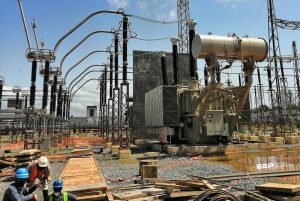Onome Amuge
The federal government has announced its intention to work with the private sector to raise part of the $10 billion funding required to guarantee consistent and reliable electricity for the country over the next five to ten years.
This collaboration forms part of the government’s broader strategy to address the chronic power supply challenges that have long plagued the country.
The need for private sector involvement in co-financing and enhancing the performance of power infrastructure was the central focus of discussion during a recent meeting between Adebayo Adelabu, the minister of power and Jobson Ewalefoh, the director-general of the Infrastructure Concession Regulatory Commission (ICRC).
The recent consecutive collapse of the national grid has prompted the Minister of Power to issue a directive for the replacement of old equipment in the power infrastructure.
While this action is aimed at resolving the recurrent grid collapse, Adelabu has cautioned that additional funding is necessary to finance the implementation of strategies to prevent future grid collapses.
Adelabu further revealed that the government will need to source additional funding from the 2024 Supplementary Budget and the 2025 Appropriation Bill in order to fund the strategies needed to curb the frequent grid collapses.
During the meeting, the power minister disclosed that Nigeria requires a minimum funding of approximately $10 billion over the next decade to achieve a stable 24-hour power supply throughout the country.
He said, “For us to achieve 24-hour power supply across Nigeria in the next five to 10 years, there is a minimum funding requirement of about $10bn in the next 10 years,” the minister stated.
He added, “The government cannot afford that when there are funds critical sectors in need of funding. Can the government do it alone? No! This is why we have to look for or marshal private sector funds while still retaining government interest and ownership. That is where ICRC comes in. We need to do this in collaboration with the private sector and the best way is through concessions.”
Jobson Ewalefoh, the director-general of the ICRC, responded to the minister’s statement by proposing that the ICRC could facilitate private sector investment in the power sector as part of the $10 billion needed to improve electricity supply.
Ewalefoh noted that increased private sector involvement could spur more foreign direct investment in other sectors, which would ultimately stimulate economic growth and development.
Ewalefoh, acknowledging the critical importance of power in driving economic growth, stressed the urgent need to maximize the performance of existing infrastructure while also securing funding for new projects.
The ICRC DG underscored the complexity of challenges facing the power sector, which he acknowledged were multifaceted and beyond the scope of funding alone. He suggested that inter-agency cooperation and public-private partnerships would be instrumental in addressing these limitations and enhancing the performance of the Nigerian power sector.
“The investment required in power is very huge and the government cannot fund it alone, so we have to leverage on the financing capacity of the private sector. That is why the ICRC was set up to regulate this leverage,” he stated.
Ewalefoh, in support of President Bola Tinubu’s directive to accelerate public-private partnership (PPP) investment, revealed that the ICRC has implemented a six-point policy direction to streamline the PPP process and facilitate service delivery.
He noted that while the ICRC has streamlined its processes to accelerate project delivery and encourage investment, it remains committed to upholding regulatory standards to prevent unnecessary delays or the assumption of contingent liabilities by companies lacking the requisite capacity.
Ewalefoh disclosed that the ICRC is now mandating the incorporation of conditions precedent into all PPP agreements, stipulating that a preferred bidder who breaches the terms of the agreement will have their contract immediately nullified.









